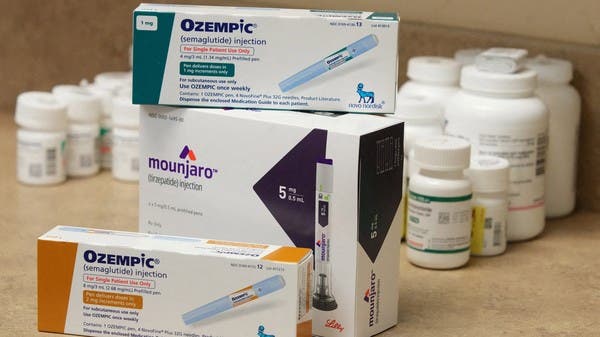Common breast cancer treatment limits success of Ozempic, other weight loss drugs
A commonly used breast cancer treatment may reduce the effectiveness of popular weight loss drugs such as Ozempic, according to a new study.
Researchers found weight loss interventions are less successful among breast cancer survivors taking aromatase inhibitors compared to women without breast cancer who are not using these treatments.
For all the latest headlines follow our Google News channel online or via the app.
Aromatase inhibitors are used to treat some types of breast cancer or keep it from returning. They may also be used to help prevent breast cancer in some women who are at a high risk of developing it.
These medications block the activity of an enzyme called aromatase, which the body uses to make estrogen in the ovaries and other tissues.
Blocking aromatase lowers the body’s estrogen, which may stop the growth of cancer cells that need estrogen to grow.
“Weight gain is a common concern in breast cancer survivors,” said lead researcher Si-ma Fansa, M.D., of the Mayo Clinic in Rochester, Minn. She said studies have shown that aromatase inhibitors may be a risk factor for weight gain. Weight gain and obesity, in addition to being associated with breast cancer recurrence and breast cancer-related death, can lead to heart disease and heart-related death.
“This is the first study assessing response to weight loss medications in a subgroup of breast cancer survivors taking aromatase inhibitors,” Fansa said. “Our results highlight the need to develop better approaches to manage weight gain in patients with a history of breast cancer taking aromatase inhibitors. Preventing weight gain in this group or treating obesity effectively will improve breast cancer outcomes, prevent further health complications, and improve quality of life for these people.”
Weight loss drugs half as effective
The study included 99 participants, with 63 women who had a history of breast cancer and were taking aromatase inhibitors and weight loss medications (liraglutide, semag-lutide, or phentermine).
The remaining 36 women did not have a history of breast cancer and were only taking weight loss medications.
The results demonstrated that women in the breast cancer group experienced less weight loss at the three, six, and 12-month checkpoints compared to women without a history of breast cancer. The difference in weight loss percentages was noticeable (3.7 percent vs. 5.6 percent at 3 months, 3.9 percent vs. 9.5 percent at 6 months, and 5.2 percent vs. 10.5 percent at 12 months).
“Our results highlight the need to develop better approaches to manage weight gain in patients with a history of breast cancer taking aromatase inhibitors,” says lead researcher Sima Fansa, M.D., of the Mayo Clinic in Rochester, Minn., in a media release. “Preventing weight gain in this group or treating obesity effectively will improve breast cancer outcomes, prevent further health complications, and improve quality of life for these people.”
Weight gain and obesity are associated with breast cancer recurrence, breast cancer-related death, and increased risk of heart disease and related complications.
Ozempic and similar drugs have been gaining global notoriety for their success in rapid weight loss.
As Al Arabiya English reported earlier this year, a surging number of people – including those in the UAE – heading to health clinics, pharmacies and hospitals trying to get their hands on diabetes injections such as Saxenda and Ozempic to use the medications for weight loss.
Interest peaked after videos on TikTok and advertisements on Instagram promoted the drugs as a miracle cure for stubborn fat. Celebrities getting a hold of the drug to drop a few dress sizes also played a role in the increased interest.
Otherwise known as semaglutide, Ozempic and other similar drugs, such as Wegovy, originated as a diabetes medication, and were FDA-approved to treat obesity in 2021, becoming so popular it caused shortages.
Semaglutide contains a compound that mimics a hormone called glucagon-like peptide-1 (GLP-1) and helps the pancreas release the right amount of insulin when blood sugar levels are high. It also makes you feel full because it slows down stomach emptying and suppresses appetite.
The drug has helped people shed up to 15 percent of their body weight. However, in clinical trials, people complained of side effects, including constipation, nausea, vomiting, headaches and diarrhea.
Fansa said the report’s findings underscore the importance of developing improved strategies to manage weight gain in breast cancer patients taking aromatase inhibitors. By preventing weight gain and effectively addressing obesity, better outcomes can be achieved in breast cancer treatment, reducing the risk of complications and enhancing the quality of life for these individuals.
Researchers presented their findings at the Endocrine Society’s annual meeting in Chicago.
Read more:
UK to explore wider access to obesity drugs in $50 million pilot
Diabetes drug Ozempic being tested for treatment of Alzheimer’s, brain disorders
What are the different weight-loss drugs? Ozempic, Wegovy, and a ‘miracle cure’ plant
No Byline Policy
Editorial Guidelines
Corrections Policy
Source
